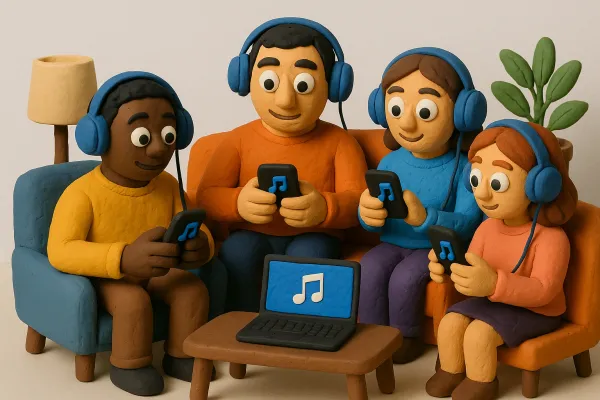Discover How Rap Managers Looking for Artist Talent Are Shaping the Future of Hip-Hop

In the ever-evolving world of hip-hop, rap managers looking for artist talent play a key role in shaping the future of the genre. They are not just behind the scenes; they are the ones who discover new voices, guide artists through their careers, and adapt to the rapid changes in the music industry. With the rise of social media and streaming platforms, the landscape has shifted dramatically, and these managers are at the forefront of this transformation, helping to elevate the next generation of hip-hop stars.
Key Takeaways
- Rap managers are crucial in finding and promoting new talent in hip-hop.
- They help artists define their brand and creative direction.
- The role of A&R has changed significantly with the rise of digital platforms.
- Diversity is becoming a hallmark of the modern rap scene, breaking traditional barriers.
- Technology is reshaping how managers work with artists, making collaboration easier than ever.
The Role Of Rap Managers In Talent Discovery
We all know that the music industry is tough, especially for hip-hop artists trying to break through. That's where rap managers come in. They're like the scouts and coaches of the music world, always on the lookout for the next big thing. Let's break down how we, as managers, find and nurture talent.
Scouting New Artists
Finding fresh talent is a big part of our job. We're constantly searching for artists with that special something. This means hitting up local shows, checking out online platforms, and keeping our ears to the ground in the music community. It's about being proactive and knowing where to look. We're not just looking for good rappers; we're looking for artists with a unique voice and a strong work ethic. For example, we might spend hours on SoundCloud, sifting through tracks, or attend open mics in different neighborhoods. The goal is to discover someone like Jodiesama, who has a unique sound.
Networking In The Industry
Networking is key. We spend a lot of time connecting with other industry people – producers, label execs, promoters, and even other managers. These connections can lead to new talent discoveries or opportunities for artists we already represent. It's a small world, and knowing the right people can make all the difference. We attend industry events, conferences, and even just casual meetups to build and maintain these relationships. It's not always about what you know, but who you know, and who knows you.
Utilizing Social Media
Social media has changed the game. Platforms like Instagram, TikTok, and YouTube are goldmines for finding new talent. We keep an eye on trending sounds, viral challenges, and emerging artists who are building a following online. It's not just about finding someone with a lot of followers; it's about finding someone who's engaging with their audience and creating a buzz. We use social media analytics to track artists' growth and engagement, helping us identify potential stars early on. It's a powerful tool for talent discovery.
We're always looking for new ways to find talent. The music industry is constantly changing, so we have to be adaptable and open to new ideas. Whether it's through traditional methods like attending shows or using new technologies like social media analytics, our goal is to find the next generation of hip-hop stars.
How Managers Shape Artist Careers
We all know that managers are way more than just appointment setters. They're like the architects of an artist's whole vibe and trajectory. It's a big deal.
Guiding Creative Direction
Okay, so picture this: an artist has the raw talent, but sometimes they need someone to help them focus that energy. That's where we come in. We're not trying to change who they are, but we help them refine their sound, pick the right beats, and even suggest collaborations that could blow people's minds. It's about seeing the bigger picture and helping them get there. It's like, we're the co-pilots on their creative journey. We help them make sure the music promotion and marketing is fire and true to who they are.
Building Brand Identity
It's not just about the music, right? It's about the whole package. We work with artists to craft their image, their story, and how they present themselves to the world. Think about it – what do they stand for? What's their message? How do they want people to see them? We help them answer those questions and make sure their brand is authentic and consistent. This includes everything from their social media presence to their music videos. It's about creating a lasting impression.
Navigating Industry Challenges
The music industry is a wild place, full of ups and downs, and let's be real, a lot of confusing stuff. We're there to help artists dodge the pitfalls, negotiate deals, and protect their interests. Whether it's dealing with contracts, handling disputes, or just offering advice, we're in their corner, making sure they don't get taken advantage of. It's about having someone who's got their back, no matter what. We help them understand the California hip-hop scene and how to thrive in it.
Being a manager is like being a shield. We absorb the chaos so the artist can focus on creating. It's about trust, loyalty, and a shared vision. We're not just managing careers; we're building legacies.
The Evolution Of A&R In Hip-Hop
We've seen some serious changes in how artists get discovered and developed. It's not just about record labels anymore; the whole game has changed.
From Traditional To Digital
Remember the days when A&Rs were all about scouting at clubs and getting demos? That's still part of it, but now it's mixed with a heavy dose of online digging. We're talking about sifting through SoundCloud, YouTube, and social media to find the next big thing. The shift from physical to digital has opened up a whole new world of talent discovery. It's wild how much the game has changed. The role of A&R teams is more important than ever.
The Impact Of Streaming
Streaming platforms have completely flipped the script. Artists can blow up without ever signing to a major label. This means A&Rs have to be even more on the ball, identifying trends and understanding what's resonating with listeners in real-time. It's not just about finding talent; it's about understanding data and algorithms.
- Data analysis helps identify trending artists.
- Playlist performance indicates listener engagement.
- Social media buzz reveals potential stars.
Adapting To New Trends
Staying ahead means keeping up with the latest trends. From trap to drill to whatever's next, A&Rs need to be plugged in. It's about understanding the culture, the sound, and the audience. The ability to adapt is key. We're constantly learning and evolving, and that's what makes this so exciting.
The music industry is a constantly shifting landscape. To stay relevant, we must embrace change and adapt our strategies accordingly. This means being open to new sounds, new platforms, and new ways of connecting with artists and fans.
Diversity In The Rap Scene
It's exciting to see how much the rap scene has changed. It wasn't that long ago when things felt pretty one-dimensional, but now? It's like a whole new world. We're seeing artists from all walks of life, bringing their unique stories and sounds to the table. This isn't just about checking boxes; it's about genuinely embracing the richness that different perspectives bring to the music.
Embracing Different Voices
We're at a point where the industry is starting to understand that different voices are not just 'nice to have' but are essential for growth. It's not just about male rappers anymore; women are killing it, and artists from various cultural backgrounds are finally getting the recognition they deserve. This shift is making the music way more interesting and relatable.
Breaking Down Barriers
Breaking down barriers is tough, but we're seeing progress. It's about challenging old ideas and creating opportunities for those who've been historically excluded. This means supporting independent artists, pushing for fair representation in media, and calling out the BS when we see it. It's a group effort, and we all have a role to play.
Fostering Inclusivity
Inclusivity isn't just about inviting people to the party; it's about making sure everyone feels welcome and has a chance to shine. We need to create spaces where artists can be themselves without fear of judgment or discrimination. This means promoting respect, understanding, and collaboration across different communities within hip-hop. It's about building a scene where everyone can thrive. The hip hop art form is constantly evolving.
It's about time the industry reflects the real world. The more diverse voices we have, the richer and more vibrant the music becomes. It's not just good for the artists; it's good for the culture as a whole.
The Future Of Hip-Hop Management
It's wild to think about where hip-hop management is headed. Things are changing so fast, and what worked even a few years ago might not cut it today. We're seeing a real shift in how artists connect with their fans and how managers support them. It's not just about getting a record deal anymore; it's about building a whole movement.
Emerging Trends To Watch
We're keeping our eyes peeled for a few key trends. First, data analytics is becoming huge. Managers are using data to understand what fans want, where they're located, and how they consume music. This helps them make smarter decisions about touring, marketing, and even the music itself. Second, the metaverse and Web3 are opening up new avenues for artists to connect with fans and monetize their work. Think virtual concerts, NFTs, and fan-owned music. It's still early days, but the potential is massive. Finally, we're seeing a rise in personalized fan experiences. Artists are finding ways to connect with fans on a deeper level, offering exclusive content, personalized messages, and even opportunities to collaborate on music.
The Rise Of Independent Artists
More and more artists are choosing to stay independent, and that's changing the game for managers. It's not just about getting signed to a major label anymore. Independent artists have more control over their music, their brand, and their careers. But they also need a strong team around them to handle everything from marketing to distribution to legal. Managers who can help independent artists navigate the industry and build a sustainable career are in high demand. The independent artist's career is more viable than ever.
Innovative Marketing Strategies
Traditional marketing is dead. Okay, maybe not dead, but it's definitely not as effective as it used to be. We're seeing managers get super creative with their marketing strategies, using social media, influencer marketing, and experiential events to reach new fans. It's all about creating a buzz and getting people talking. Think surprise album drops, interactive social media campaigns, and pop-up shops in unexpected locations. The key is to be authentic and to connect with fans on a personal level.
The future of hip-hop management is all about adaptability and innovation. We need to be constantly learning, experimenting, and finding new ways to support our artists. It's a challenging but exciting time to be in the industry.
Building Relationships With Artists
In this business, it's not just about finding the next big thing; it's about nurturing talent and building lasting connections. We believe that strong relationships are the bedrock of any successful artist-manager partnership. It's about more than just business; it's about mutual respect, understanding, and a shared vision.
Trust And Communication
Trust is absolutely key. Artists need to know we have their best interests at heart, and that means open and honest communication. We make it a point to be transparent about everything, from finances to creative decisions. Regular check-ins, being available to listen, and providing constructive feedback are all part of building that trust. It's a two-way street, and we value their input just as much as they value ours. We also make sure to attend key events, fostering collaboration within music communities.
Long-Term Partnerships
We're not looking for quick wins; we're in it for the long haul. We want to build careers, not just chase trends. This means investing time and energy into developing artists over years, not just months. It's about creating a sustainable path to success, and that requires commitment from both sides. We see ourselves as partners, working together to achieve shared goals.
Mentorship Opportunities
We see ourselves as more than just managers; we're also mentors. We use our experience and knowledge to guide artists, helping them navigate the complexities of the music industry. This can involve providing advice on everything from songwriting to stage presence. We also encourage artists to learn from each other, creating a supportive community where everyone can grow. It's about paying it forward and helping the next generation of talent succeed.
Building strong relationships with artists is not just good business; it's the right thing to do. It's about creating a supportive and collaborative environment where artists can thrive and reach their full potential. We believe that when artists feel valued and respected, they're more likely to produce their best work.
The Impact Of Technology On Talent Management
Technology has completely changed how we find and manage rap talent. It's not just about having a good ear anymore; it's about understanding data, using online tools, and connecting with artists in new ways. It's wild how much things have changed, and we're all trying to keep up!
Using Data Analytics
We're now using data analytics to understand what fans want and how artists are performing. This helps us make smarter decisions about marketing, touring, and even the kind of music an artist should be making. It's like having a crystal ball, but instead of magic, it's math. For example, we can track:
- Social media engagement rates
- Streaming numbers across different platforms
- Demographics of an artist's fanbase
Data doesn't lie, but it can be misinterpreted. It's our job to use these insights to guide artists, not dictate their every move. It's a fine line, but it's important to respect the creative process while still making informed decisions.
Leveraging Online Platforms
Online platforms are where it's at for finding new talent and building a fanbase. We're talking about TikTok, Instagram, YouTube – the whole shebang. It's not enough to just have a presence; you've got to know how to use these platforms to your advantage. For example, we can use social media engagement rates to understand what fans want.
- Run targeted ad campaigns
- Create engaging content that goes viral
- Connect with fans directly through live streams and Q&As
Virtual Collaborations
Virtual collaborations have opened up a whole new world of possibilities. Artists can now work together from anywhere in the world, which means we can bring together talent that might never have connected otherwise. It's pretty amazing. Here's how it works:
- Artists share files and ideas online
- Producers create beats remotely
- Mixing and mastering are done virtually
| Collaboration Type | Cost | Time to Completion | Reach |
|---|---|---|---|
| In-Person | $$$ | Longer | Local |
| Virtual | $ | Shorter | Global |
Technology is changing how companies find and keep their best workers. With tools like online job boards and social media, businesses can reach more people than ever before. These tools help them spot talent quickly and make better choices about who to hire. If you want to learn more about how technology can help your company manage talent better, visit our website today!
Wrapping It Up
So, there you have it! Rap managers are really shaking things up in hip-hop these days. They’re not just looking for talent; they’re redefining what it means to be an artist in this game. With fresh faces and new sounds popping up all over, it’s clear that the future of hip-hop is bright. These managers are like the unsung heroes, helping artists find their voice and navigate the crazy music industry. As we keep seeing more artists break through, it’s exciting to think about where hip-hop will go next. Who knows? The next big thing could be just around the corner!
Frequently Asked Questions
What do rap managers do when finding new artists?
Rap managers look for new talent by going to live shows, searching online, and talking to people in the music industry.
How do managers help artists grow their careers?
They guide artists on their music style, help build their public image, and assist with any problems they face in the industry.
What has changed in finding talent in hip-hop?
Before, it was mostly about record labels, but now, with streaming, artists can become popular on their own.
Why is diversity important in rap music?
Diversity brings in new voices and ideas, which helps the genre grow and reach more people.
What can we expect from hip-hop management in the future?
We will see more independent artists, new trends in music, and creative marketing strategies.
How does technology affect talent management in hip-hop?
Managers use data to understand trends, connect with artists online, and even collaborate virtually.





